Agriculture & Environment
Prof. John H. Muyonga Delivers Professorial Inaugural Lecture
Published
2 years agoon
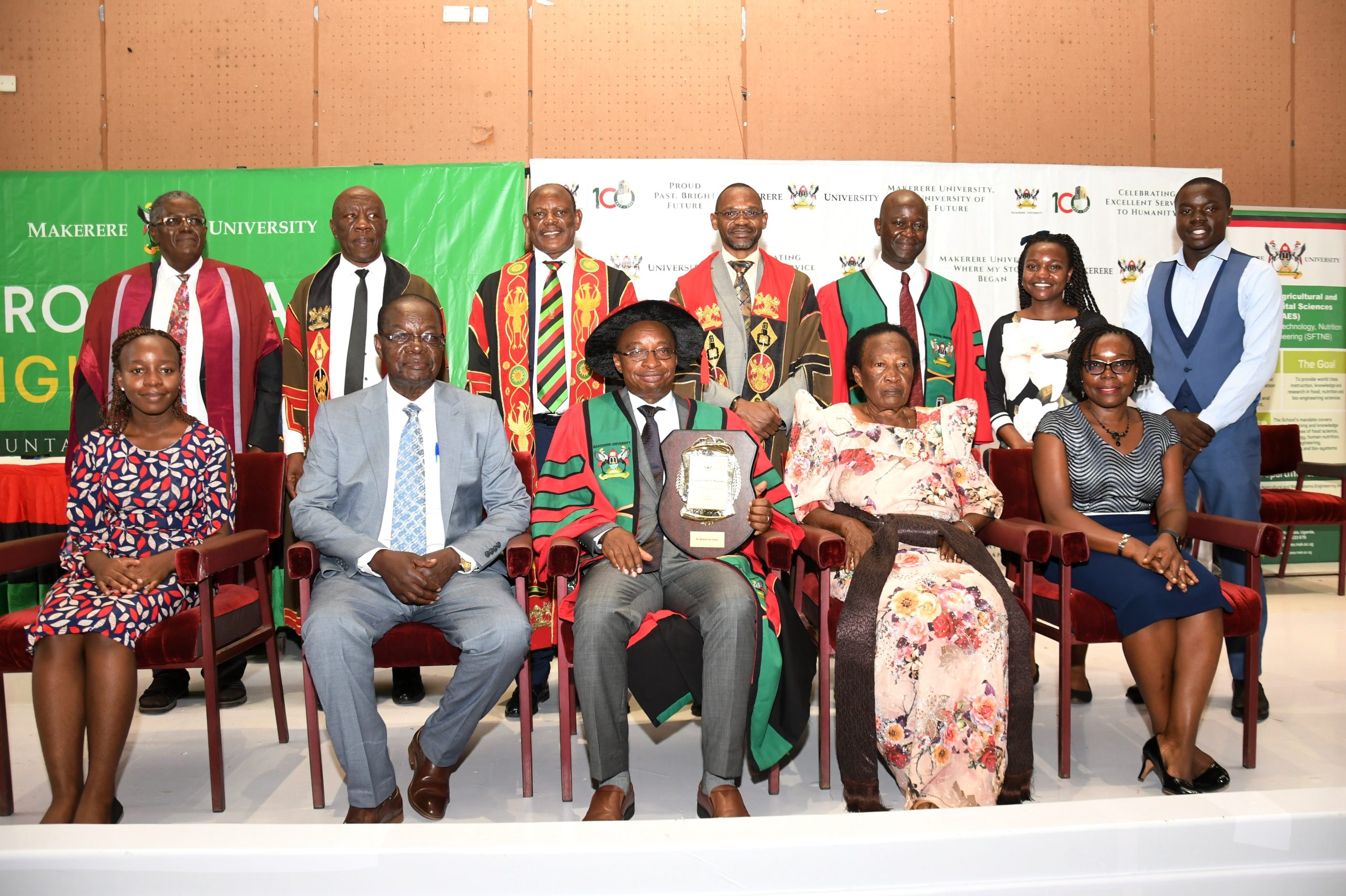
Theme: Circular Bio-economy: Applications to the Agri-food Sector
In his Lecture, Prof. John H. Muyonga highlighted the nutritional value of waste from agri-food products and explained the measures that can be taken to minimize wastage
The Inaugural Lecture
A lot of what is thrown away as waste from agri-food products contains nutrients that are crucial for the body’s immunity. This was revealed by Prof. John H. Muyonga during his Professorial Inaugural Lecture held on 23 June 2023 at the Yusuf Lule Central Teaching Facility, Makerere University. Organized under the theme: Circular Bio-economy: Applications to the Agri-food Sector, the lecture was graced by the University Top Management led by the Vice Chancellor, Prof. Barnabas Nawangwe, and attended by academics and administrators from the 10 Colleges of Makerere, as well as the family of Prof. Muyonga. Prof. Muyonga.
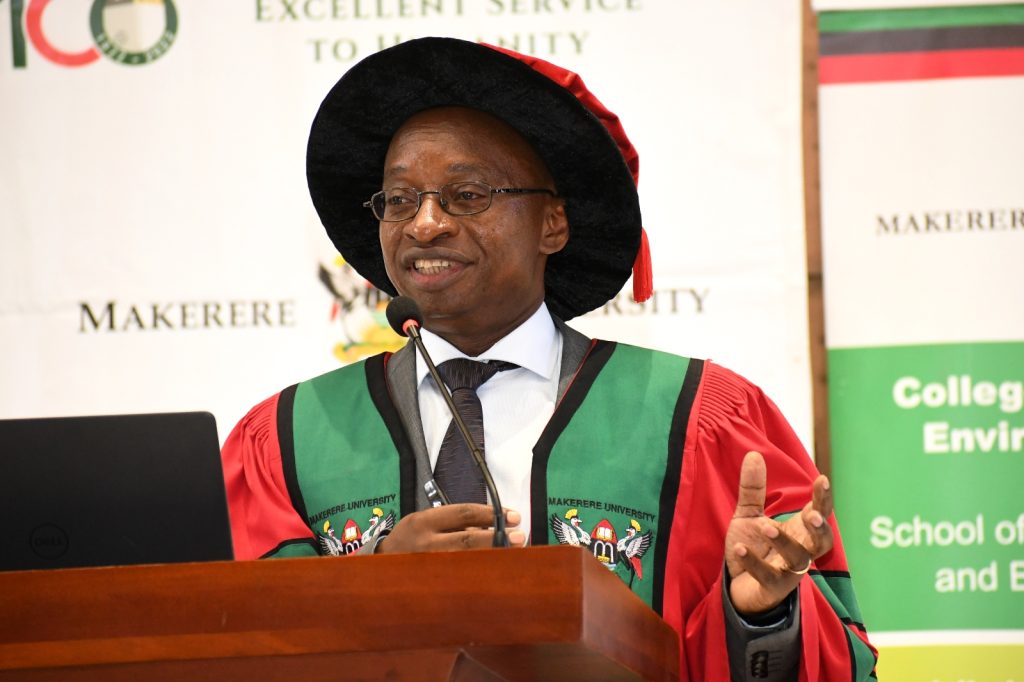
The health benefits of waste from agri-food products
In his presentation, Prof. John H. Muyonga, a Professor of Food Science at the Department of Food Technology and Nutrition, College of Agricultural and Environmental Sciences (CAES), Makerere University revealed that waste of plant origin contains nutrients and a wide diversity of non-nutrient compounds (phytochemicals), that are associated with health benefits. “The non-starch polysaccharides from fruits, vegetables and whole cereals help prevent cancer, hypertensive, hypoglycemic, and hypochloresterol. Carotenoids found in coloured fruits and vegetables equally prevent hypertensive, cancer, obesity, and support vision. The phytosterols in cereals and legume cereals bran serve as antioxidants and help in the prevention of colon cancer and hypochloresterol effect, hypertensive, pytic acid, and kidney stone formation,” Prof. Muyonga explained, further highlighting valuable components of waste from selected food crops. Citrus peels and seeds contain Pectin, essences, ethanol, D-limonene, limonoids and flavonoids. Mango peels and kernels contain fibre, vitamins, carotenoids and polyphenols, kernal fat and pectin. Passion fruit seeds and rind contain pectin and linoleic acid. Banana peels have phenolics, beta-carotenoids, anthocyanins, fiber, amino acids, polyunsaturated fatty acids, vitamins, flavonoids and potassium, whereas Avocado seeds and peels contain carbohydrates, proteins, lipids, fibres, minerals, phenolics, flavonoids, and fatty acids. Prof. Muyonga also highlighted a number of valuable components in waste from animal-based foods emphasizing the need to minimize wastage. According to Prof. Muyonga, increased adoption of circular bio-economy principles can help minimise wastage. Circular bio-economy entails reuse of as much bio-waste as possible, resulting in multiple value added products from a given volume of harvested biomass. Circular bio-economy can be used to explore the use of waste streams as raw materials for products such as new food products, feed, fuel, industrial ingredients, bio-plastics, biopharmaceuticals, bio-cosmetics, enzymes, nutritional supplements, nutraceuticals, materials for tissue repair, plasma substitutes, microbes and adsorbents. Circular bio-economy decreases dependency on natural resources by encouraging sustainable goods that generate food, feed, materials and energy using biological resources.
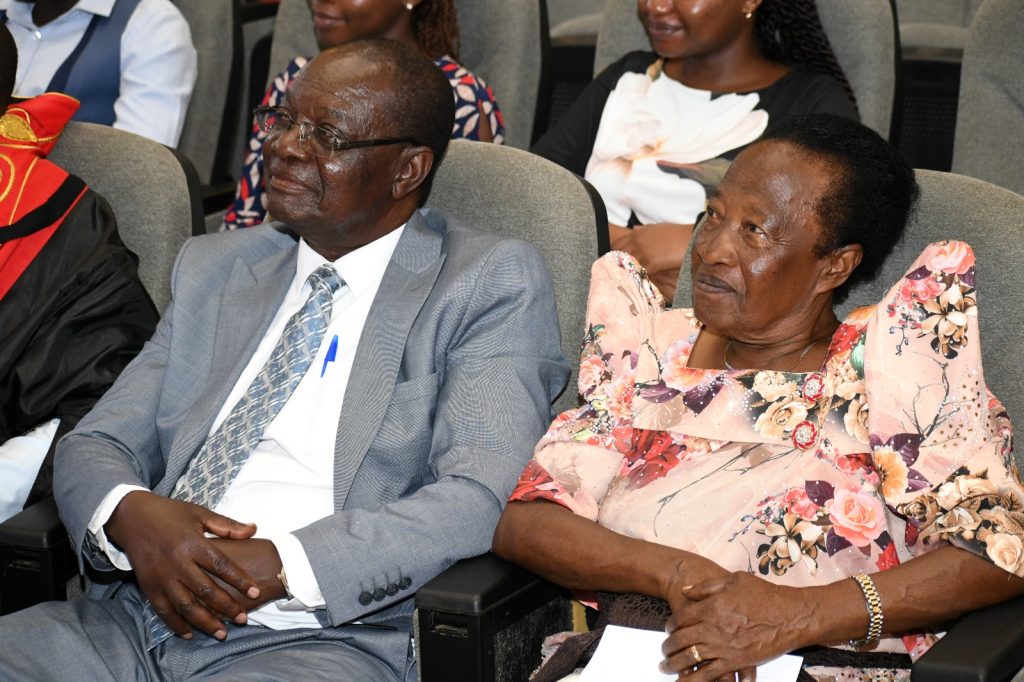
Minimising wastage of agri-food products
During his 26 years at Makerere University, Prof. Muyonga has been key in developing research capacity on previously under researched foods including grain amaranth, jackfruit, pumpkins, Solanum anguivi (katukuma), and Nile perch, among others. Working with a number of partners, he has conducted research and come up with various technologies to minimize wastage in agri-food products. Given the Nutraceutical properties of jackfruit pulp, he has conducted research and developed protocols for drying jackfruit pulp using the Refractance Window Drying technology. He has conducted studies on pumpkin and produced shelf stable flours from seed and pulp of pumpkins. Flour from the seeds is high in phytochemicals and it is recommended for weight control. Together with his research team, they have processed sweetpotato products into shelf-stable value added products. He has also conducted research on jackfruit pectin. The work entailed extracting pectin from jackfruit and assessing its properties. He also worked on the production and utilisation of passion fruit powder. Other key activities included; Tamarind seed analysis and utilisation- Tamarind seed powder was found to be suitable for use as ingredient to enhance nutraceutical properties of juices and cookies; Nile Perch collagen and gelatin studies – Collagen has a unique amino acid profile that gives it peculiar properties, including the ability to form gels when dissolved in water; Nile Perch oil extraction and Characterisation- Fish oils are rich in omega 3 fatty acids. Omega 3 fatty acids contribute to brain development and protection against cardiovascular diseases, breast, colon and prostate cancer, inflammation, depression, pain and psychosis. He also worked on characterisation of cassava leaf, processing and utilisation. Cassava leaves were found to be high in proteins, carbohydrates, beta-carotene, polyphenols and ascorbic acid.
Future plans
In future, Prof. Muyonga intends to work on the characterization of by-products from more agri-food materials produced in Uganda. He also hopes to work on the application of novel and sustainable technologies in agri-food waste valorisation to improve extraction efficiency, efficacy and limit environmental impact; and to evaluate new applications of components of agri-food waste – e.g. in bio-based packaging and bio-preservation. Prof. Muyonga also plans to undertake policy and techno-economic analysis of valorisation options.
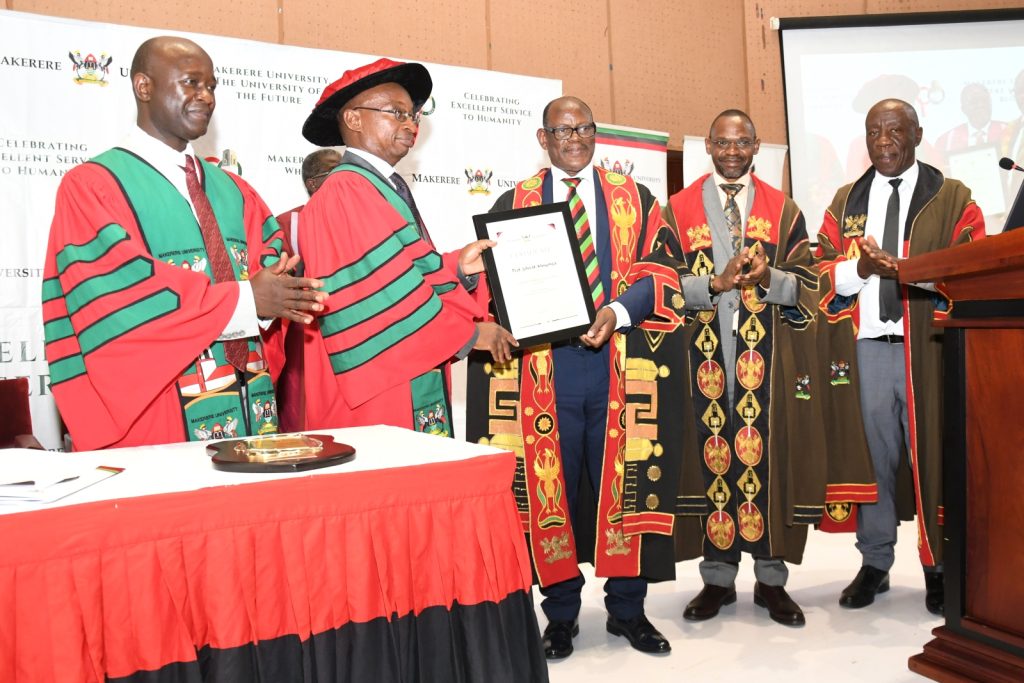
Remarks by the Vice Chancellor
According to Makerere University Vice Chancellor, Prof. Barnabas Nawangwe, an inaugural lecture is an occasion of significance in an academic staff member’s career at the university. It provides professors with the opportunity to share their achievements in research, innovation, engagement and teaching activities before an audience of members of the University community and the general public.
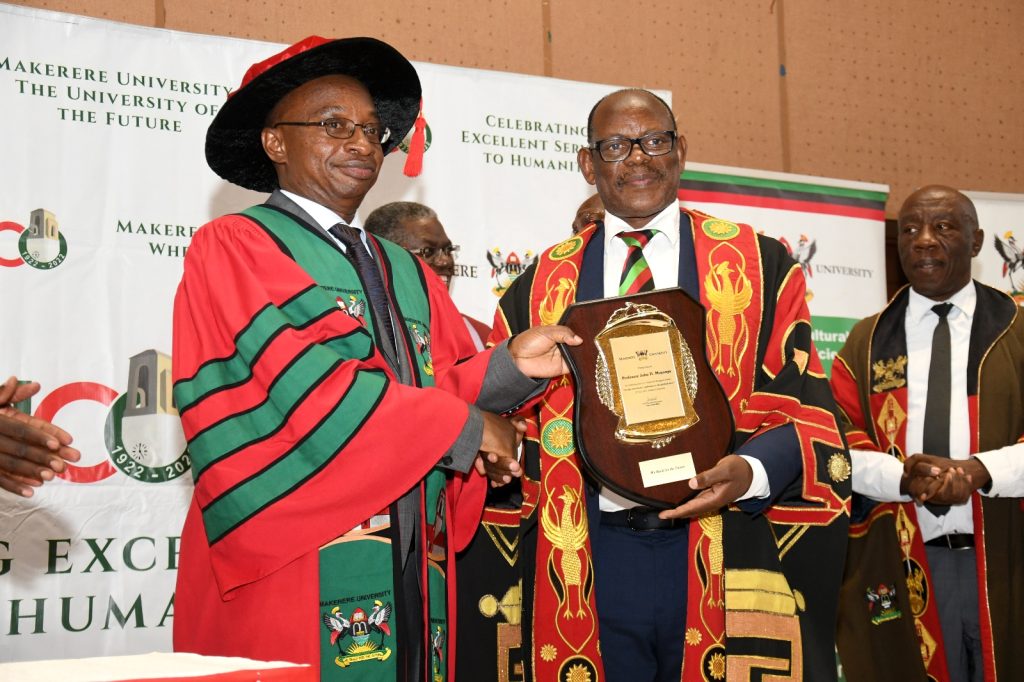
In his address, Prof. Nawangwe congratulated Prof. Muyonga for making all necessary preparations to deliver his Professorial Inaugural Lecture. “This is the way to go as we continue to boost our scholarship, image and reputation. The Professorial Inaugural Lecture should act as an inspiration to all of us as scholars to not only learn but also continuously disseminate our work. I want to implore other colleagues at the rank of Professor in the University to emulate Prof. Muyonga and also deliver their Professorial Inaugural Lectures.” The Vice Chancellor commended CAES for spearheading the initiative leading to Prof. Muyonga’s presentation and applauded the Professorial Inaugural Lectures Organising Committee (PILOC) led by Prof. David Bakibinga for a job well done in preparing for this event. Highlighting the significance of Prof. Muyonga’s lecture focus, “Circular bioeconomy: Applications to the agri-food sector”, the Vice Chancellor noted that it was quite novel and contemporary, testifying that Makerere University possesses the competencies and capacities to substantially address the national and global development challenges. “Our science, creation of new knowledge and innovations in this field will be crucial for national stability cognizant of Uganda’s rapid population growth and high levels of youth unemployment. As a premier university, we should harness the emerging opportunities including artificial intelligence which appears to be a game changer to find practical solutions to complex societal challenges at multiple scales,” he explained.
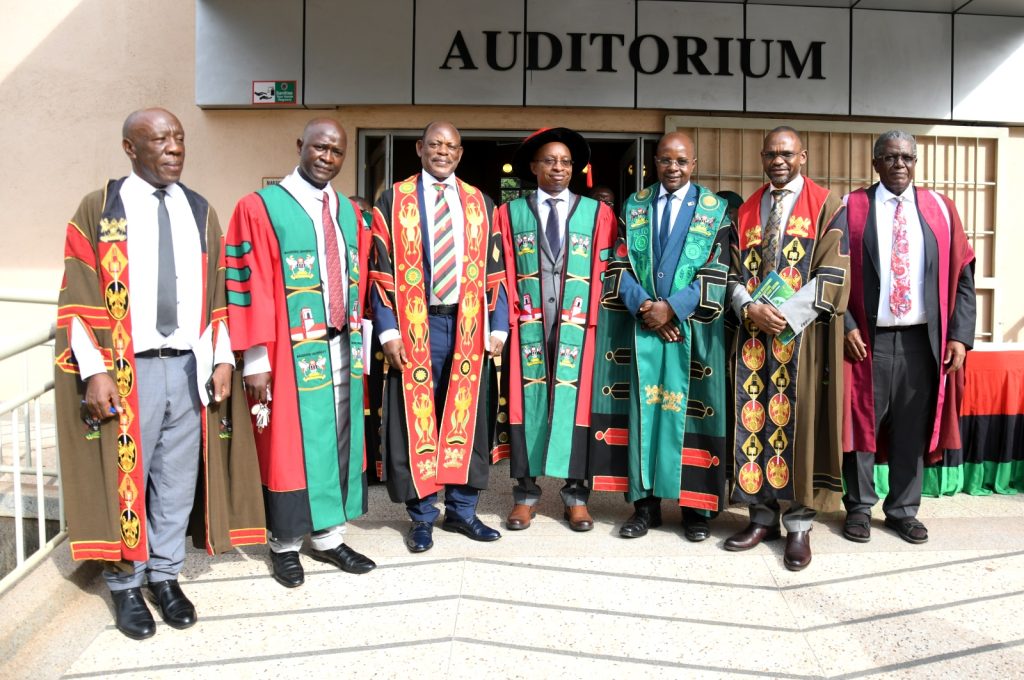
Remarks by the DVCAA
In his remarks, the First Deputy Vice Chancellor in charge of Academic Affairs, also host of the Professorial Inaugural Lectures, Prof. Umar Kakumba said Prof. Muyonga’s research works had demonstrated Makerere’s commitment and contribution to the realization of the national and global development agendas. “As academics, we have a duty to think and address the needs of the growing population, projected to reach 60 million in 2030 and 102 million in 2060. The research done by Prof. Muyonga contributes to the realization of the SDGs2,3,9,12 aimed at reducing hunger; ensuring good health and wellbeing, generating employment and income through innovation; and reversing the current consumption trends as well as promoting a more sustainable future.”
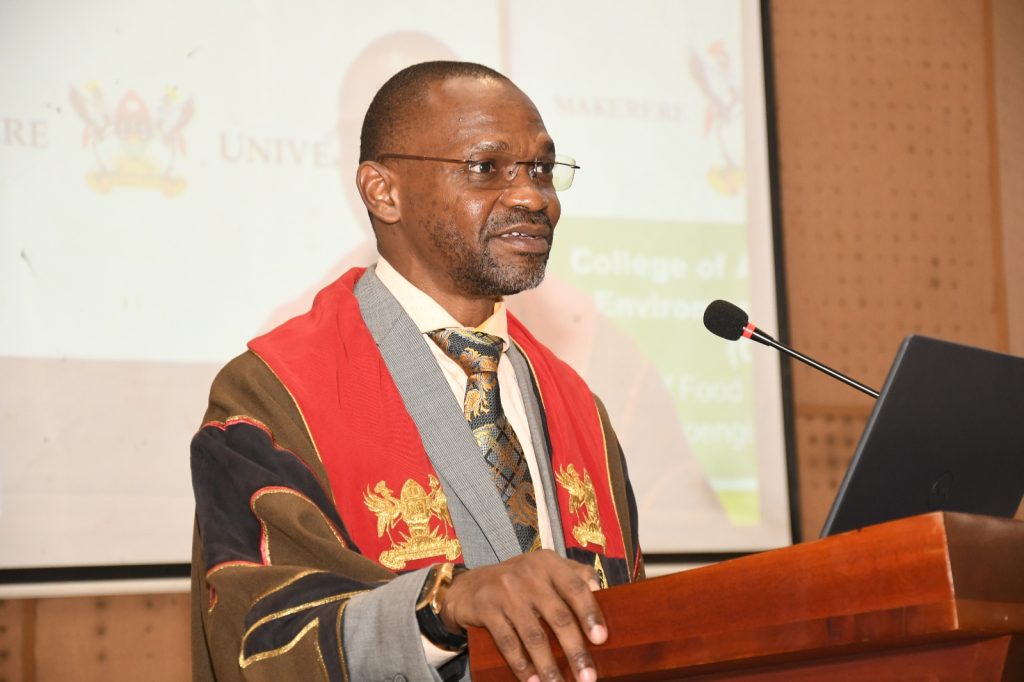
Prof. Muyonga’s biography
Prof. Muyonga holds a PhD in Food Science from the University of Pretoria, M.Sc. Food Science from Cornell University and a B.Sc. Food Science and Technology from Makerere University. He became full Professor of Food Science of Makerere University in 2010, and has served as Faculty at Makerere University since 1997. Prof. Muyonga was Head of the Department of Food Science and Technology from 2006 to 2011, during which period the Department transformed to the now School of Food Technology, Nutrition and Bioengineering and served as the pioneer Dean of the School. He has published over 80 peer reviewed journal articles, mainly in areas of nutraceutical and physico-chemical properties of traditional Ugandan foods, improvement of traditional food handling and processing methods, extrusion technology, novel drying techniques and agri-food waste valorisation. Prof. Muyonga serves as Associate Editor of two (2) international journals and his work has been cited in over 3,900 articles.
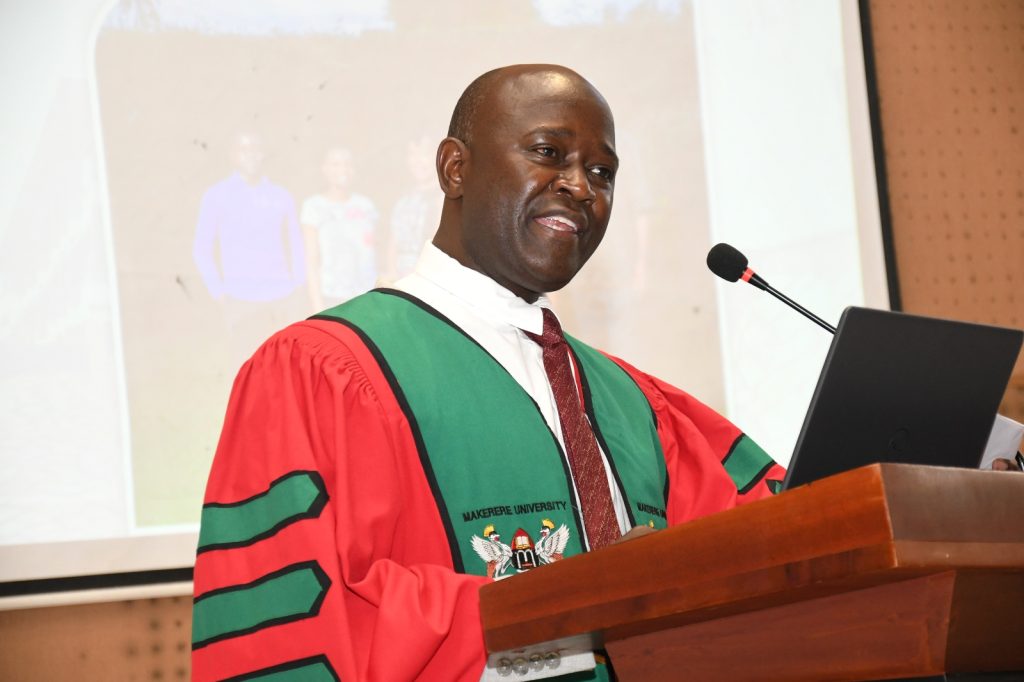
Prof. Muyonga has played critical roles in the development of capacity for food science and nutrition research and research translation in Uganda. He has led more than twenty (20) research and consultancy projects and raised over 20 million US$ for research, technology translation and institutional development. He has been key in developing research capacity on previously under researched foods including grain amaranth, jack fruit, pumpkins, Solanum anguivi (katukuma), and Nile perch, among others. As a university administrator, Prof. Muyonga coordinated the implementation of several institutional development initiatives, including a NORAD funded institutional development project for Makerere University’s Department of Food Science and Technology and the setting up of a Technology and Business Incubation Centre at Makerere University.
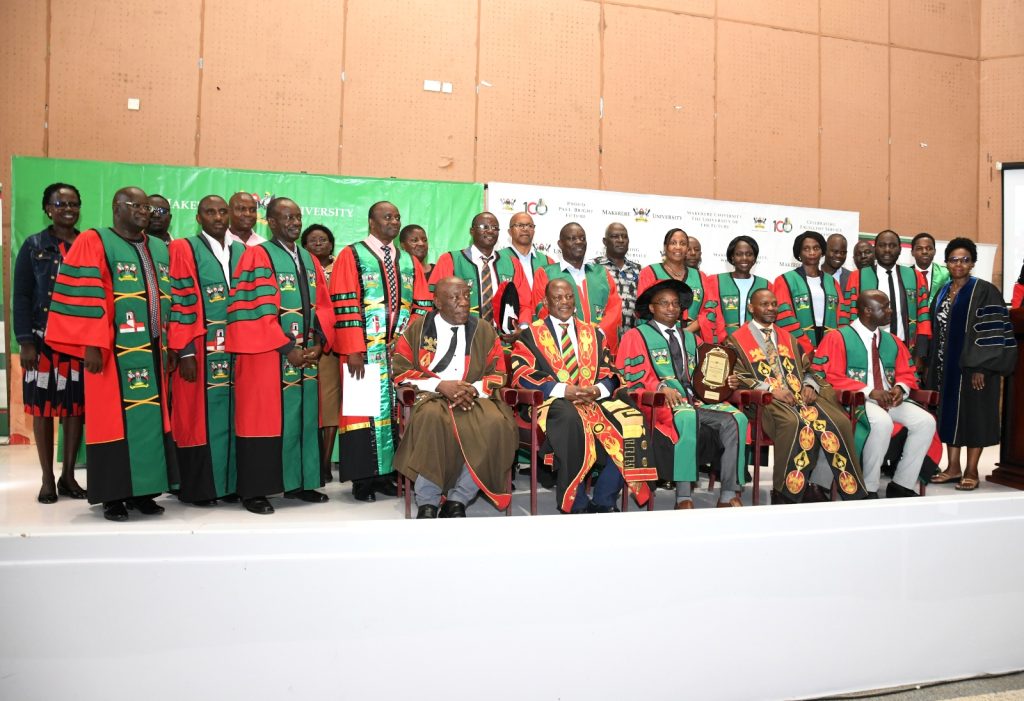
Under his leadership, the Department of Food Science and Technology and the School of Food Technology, Nutrition and Bioengineering initiated four (4) new degree programmes, registered great improvement in research infrastructure, greatly increased graduate students’ enrolment and graduation rates, markedly increased output of peer reviewed research articles and supported commercialisation of dozens of new food products. He has served on several boards, advisory and technical committees, and is currently Chair of the Management Committee of the National Agricultural Research Laboratories, as well as board member of Volunteer Efforts Development Concerns. Prof. Muyonga is a Fellow of the Uganda Academy of Sciences and professional member of the Institute of Food Technologists (USA). He was the 2009 TWAS young scientist, is an alumnus of the Global Young Academy, UN University and TWAS affiliate programme. He was previously member of the scientific advisory committee of the Bill and Melinda Gates funded Banana Biotechnology Programme and served as Technical Evaluator for the World Bank African Centres of Excellence for Central and Western Africa and for the European Commission research programmes. Prof. Muyonga is also a Rotarian and has served in several roles in his club (Rotary Club of Kampala North). He is a Paul Harris Fellow (PHF+3) and is actively engaged in numerous Rotary projects supporting the underserved.
You may like
-
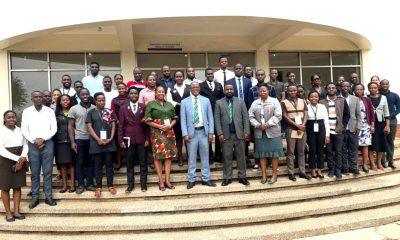

Mak Moves to Revitalize Food Technology & Business Incubation Centre to Drive Innovation & Entrepreneurship
-
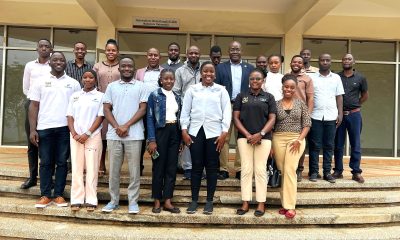

SophiA Project Upgrades Medical Infrastructure at Buvuma Health Centre IV, Trains Technicians for Maintenance Works
-
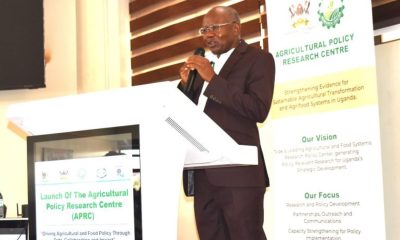

APRC Trains Graduate Students & Stakeholders in the Use of the African Agriculture Adaptation Atlas
-
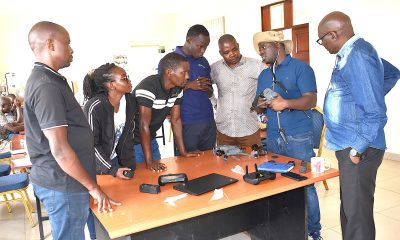

NbS4Tea Project Team Makes Great Progress, Deploys Drones for Data Collection
-
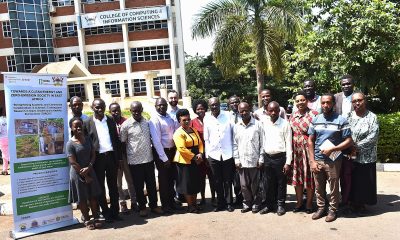

New Mak-CAES Project to Spur Green Growth in East Africa
-
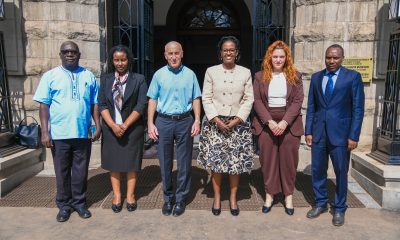

Israeli Ambassador Lotem Talks Innovation on Farewell Visit
Agriculture & Environment
Mak Moves to Revitalize Food Technology & Business Incubation Centre to Drive Innovation & Entrepreneurship
Published
5 days agoon
July 14, 2025By
Mak Editor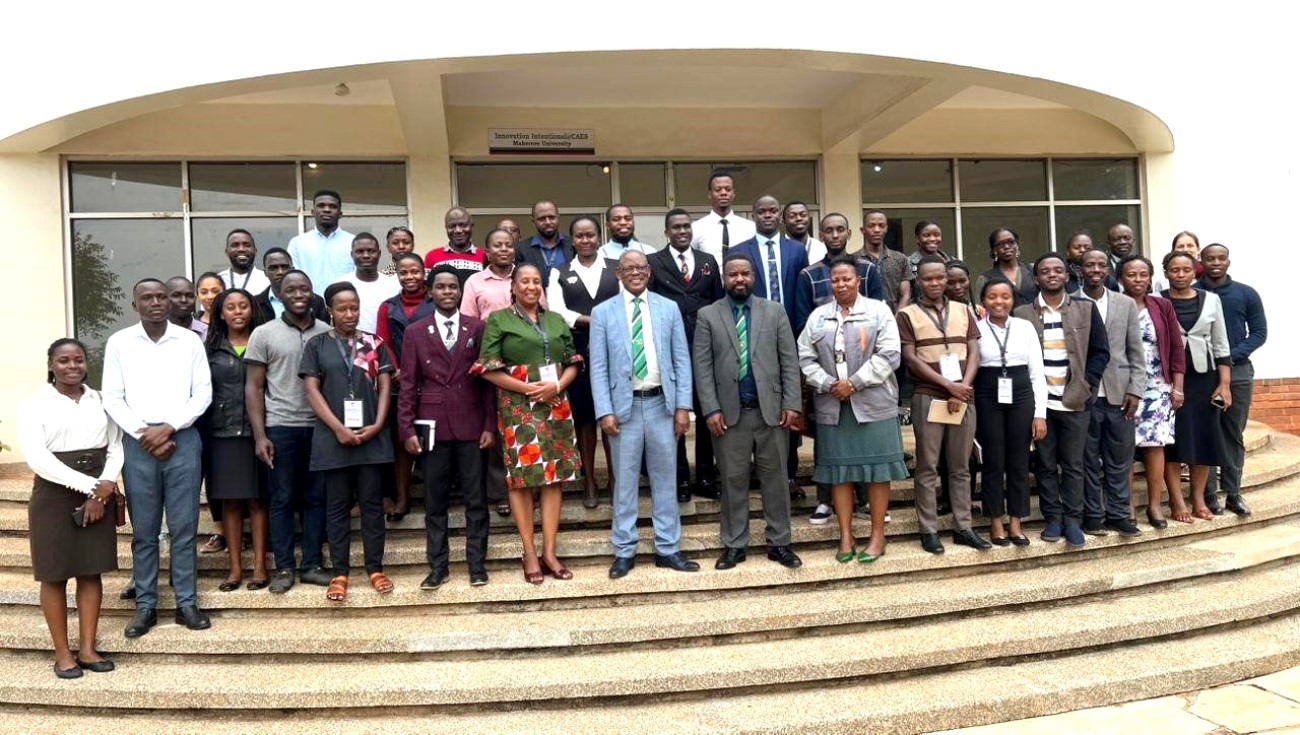
By Ssembogga Derrick
Makerere University marked a significant milestone on Thursday, 10th July 2025, with the launch of the revitalization programme for the Food Technology and Business Incubation Centre (FTBIC). This initiative is poised to position the FTBIC as a national hub for food innovation, student enterprise development, and agro-industrial transformation.
Hosted under the School of Food Technology, Nutrition and Bioengineering (SFTNB) at the College of the Agricultural and Environmental Sciences (CAES), the revitalization of the FTBIC is intended to bridge the gap between academia and industry. “We aim to achieve this by supporting food-based start-ups, enhancing graduate entrepreneurship, and promoting the commercialization of research,” Dr Julia Kigozi, Dean, SFTNB explained. The project receives critical funding from the Makerere University Research and Innovations Fund (MakRIF), which consistently supports innovation and research-based development at the university.
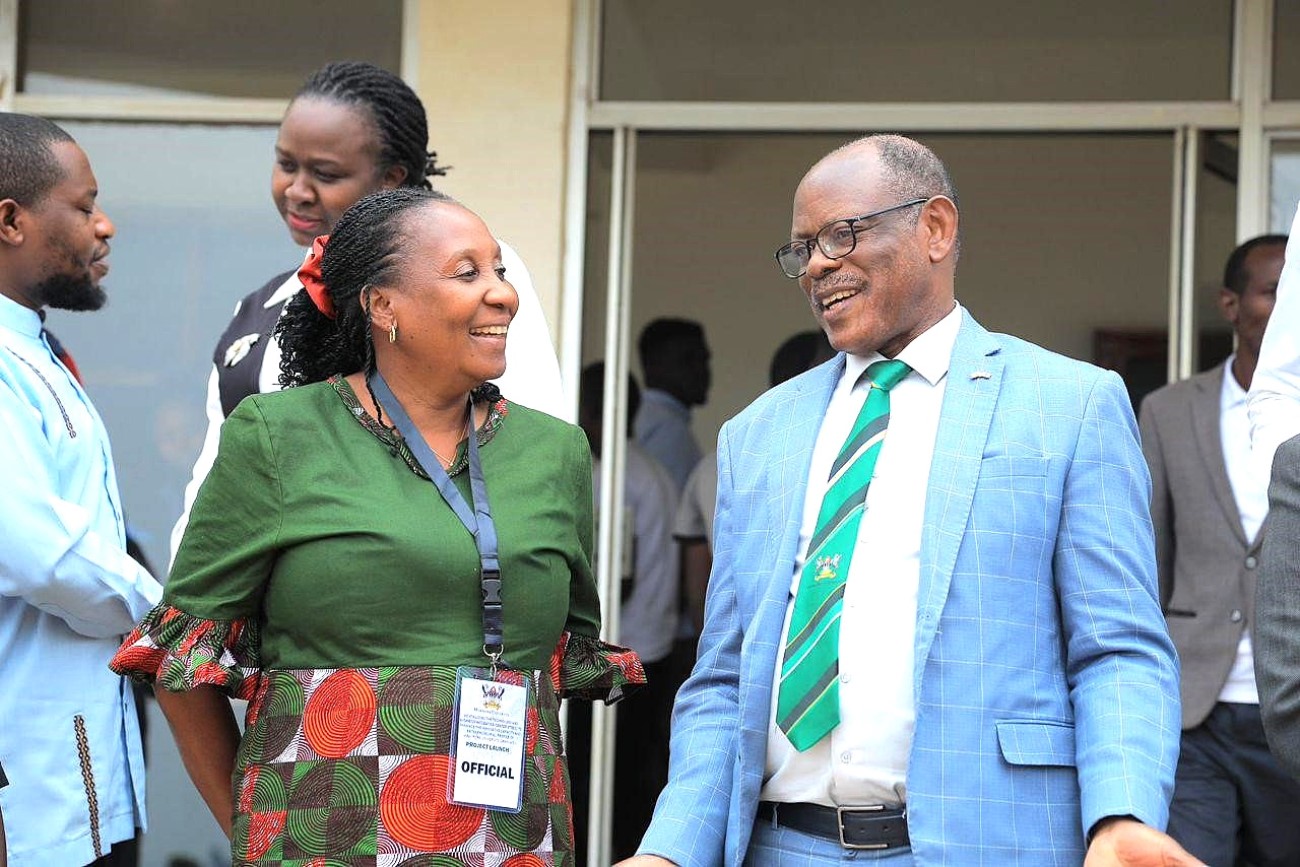
Unveiling a New Strategic Vision
The event, held under the theme “Revitalizing FTBIC to Unlock Innovation and Entrepreneurship Potential among Makerere University Graduates”, marked the official launch of the Centre’s revitalization programme to key stakeholders. It featured the presentation of FTBIC’s new strategic vision and direction, highlighting the commitment of the institution and its partners to fostering graduate entrepreneurship and innovation in food systems. The event also aimed to raise awareness of the Centre’s crucial role in supporting industry, research, and national development.
Participation of stakeholders
The launch attracted a vibrant and diverse audience of over 50 participants. Among the attendees were student representatives; partners from other incubation centers both within and outside Makerere University, including MIIC, UNIPOD, and DGI; as well as representatives from national innovation stakeholders such as Uganda Industrial Research Institute (UIRI) and StartHub Africa.
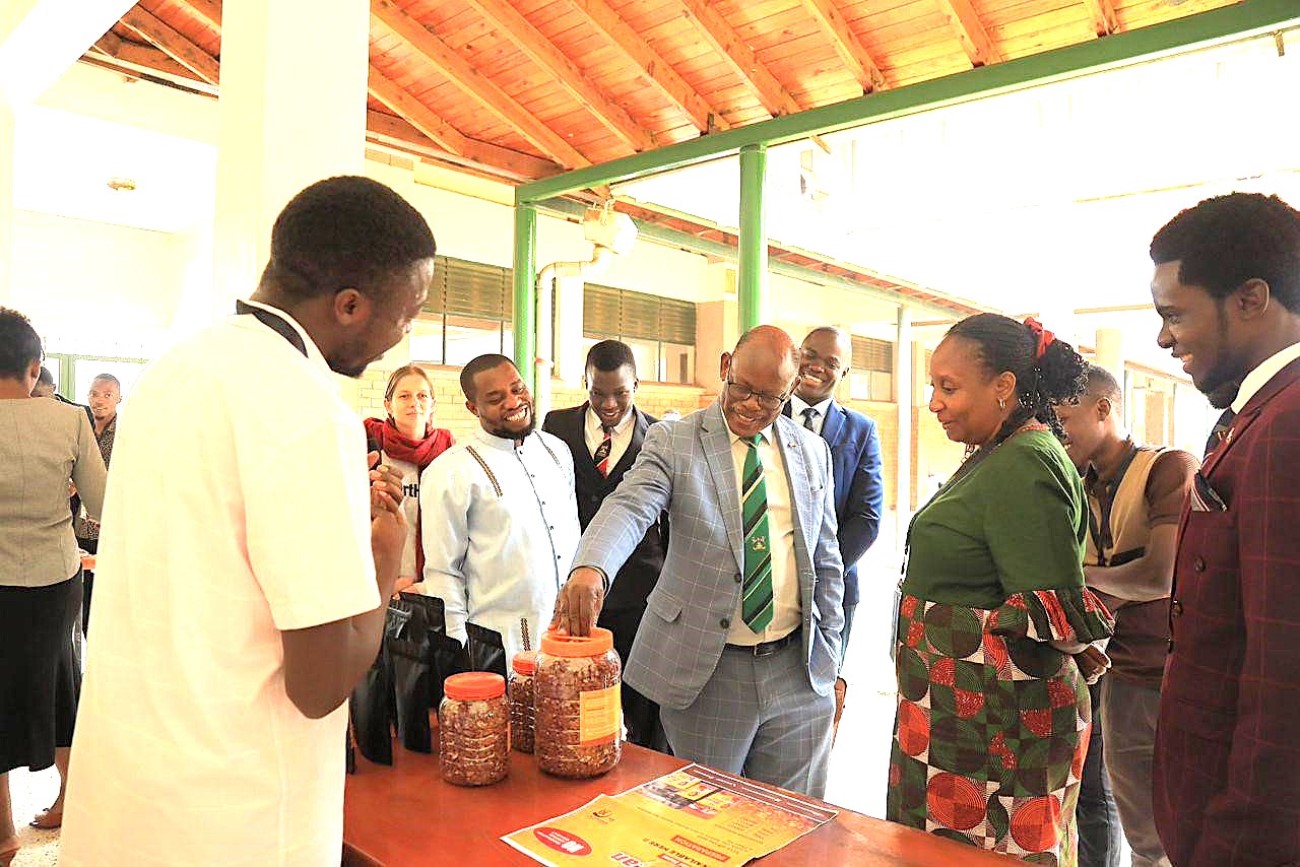
Most notably, the event was honored by the presence of the Vice Chancellor of Makerere University Prof. Barnabas Nawangwe. The Vice Chancellor commended the revitalization efforts, acknowledging the Centre’s immense potential to incubate hundreds of food-based start-ups and create employment opportunities for thousands of graduates. “The Centre is now well-positioned to become a flagship platform for innovation, employment creation, and agro-industrial development in Uganda and beyond. Makerere University remains committed to supporting such initiatives that align with national priorities and global development goals.”
The event featured the unveiling of the operational framework for the revitalized Centre, highlighting its commitment to innovation, entrepreneurship, and practical graduate training. Stakeholders in attendance expressed enthusiasm and pledged support for future collaboration, research, and product development initiatives aligned with national development priorities. The event also provided a platform to deepen partnerships with private sector actors and development organizations, reinforcing confidence in the Centre’s potential to serve as a national model for university-led incubation.
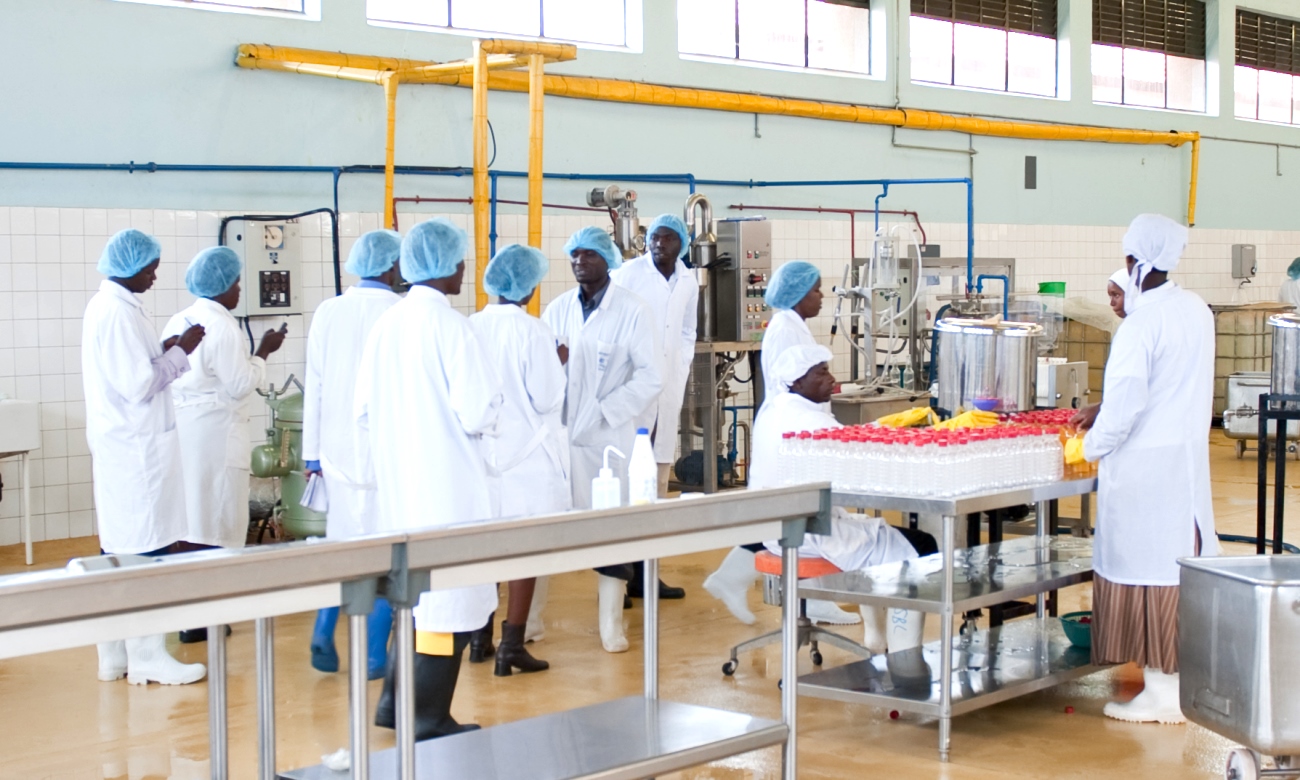
Agriculture & Environment
SophiA Project Upgrades Medical Infrastructure at Buvuma Health Centre IV, Trains Technicians for Maintenance Works
Published
1 week agoon
July 9, 2025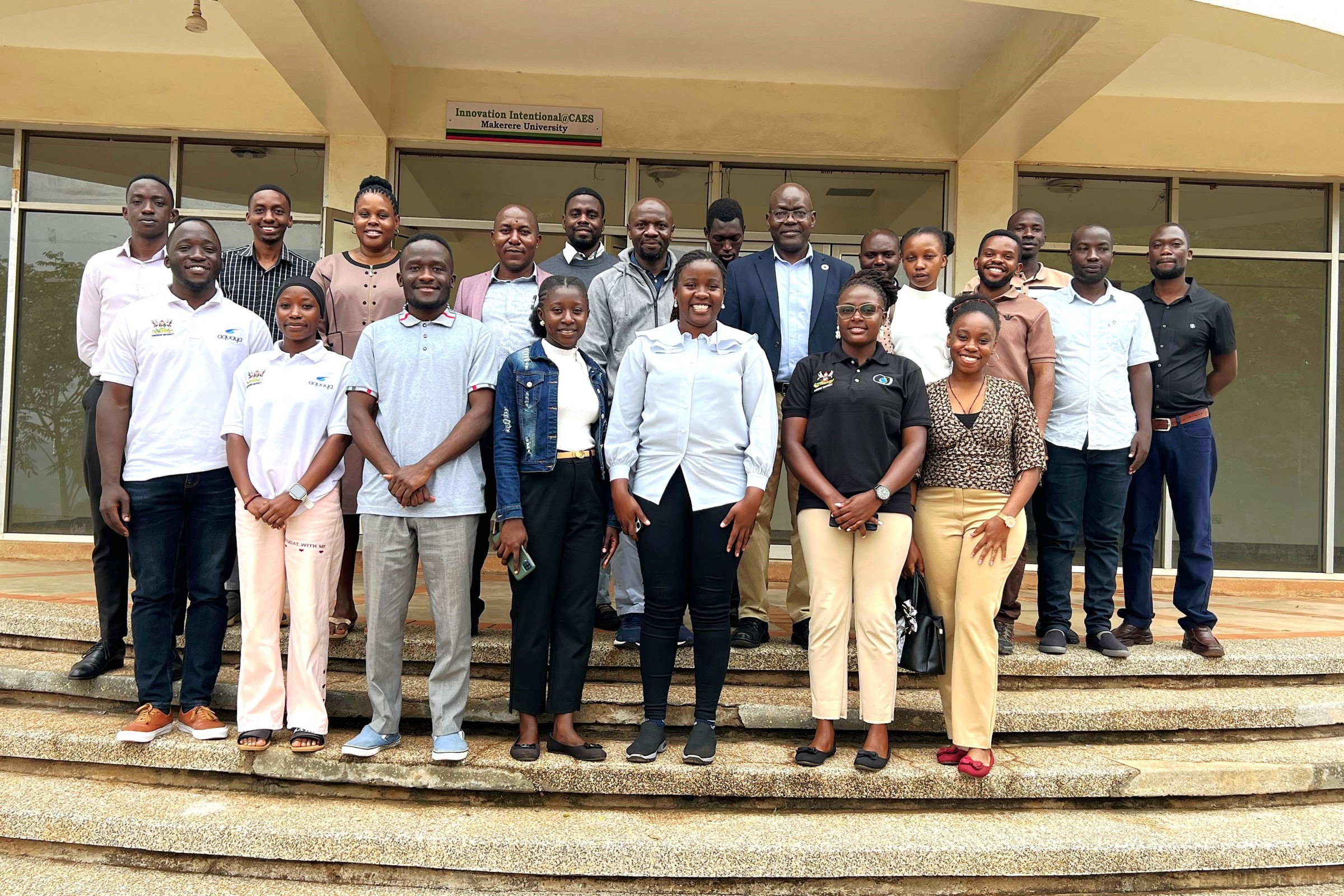
Overview of the Sustainable Off-Grid Solutions for Pharmacies and Hospitals in Africa (SophiA) Project
Despite ongoing urbanization across Africa, the majority of the population still resides in rural and remote areas, where infrastructure development remains limited. These regions face significant challenges such as lack of access to healthcare, education, clean water, and reliable electricity, contributing to higher rates of illness and poverty compared to urban centres. According to reports, Sub-Saharan Africa has approximately 120,000 public health facilities (22,000 hospitals and 98,000 health posts), of which around 26% lack any electricity access, and only 28% have reliable power supply.
Access to good healthcare is critical for sustainable development. However, many rural medical centres operate under harsh conditions – using polluted water, lacking cooling for medicines, and facing poor sanitation – largely due to unreliable electricity and water supply. Although half of the population in Sub-Saharan Africa lacks electricity, the region has abundant renewable energy potential that can be effectively harnessed through off-grid solar photovoltaic (PV) systems.
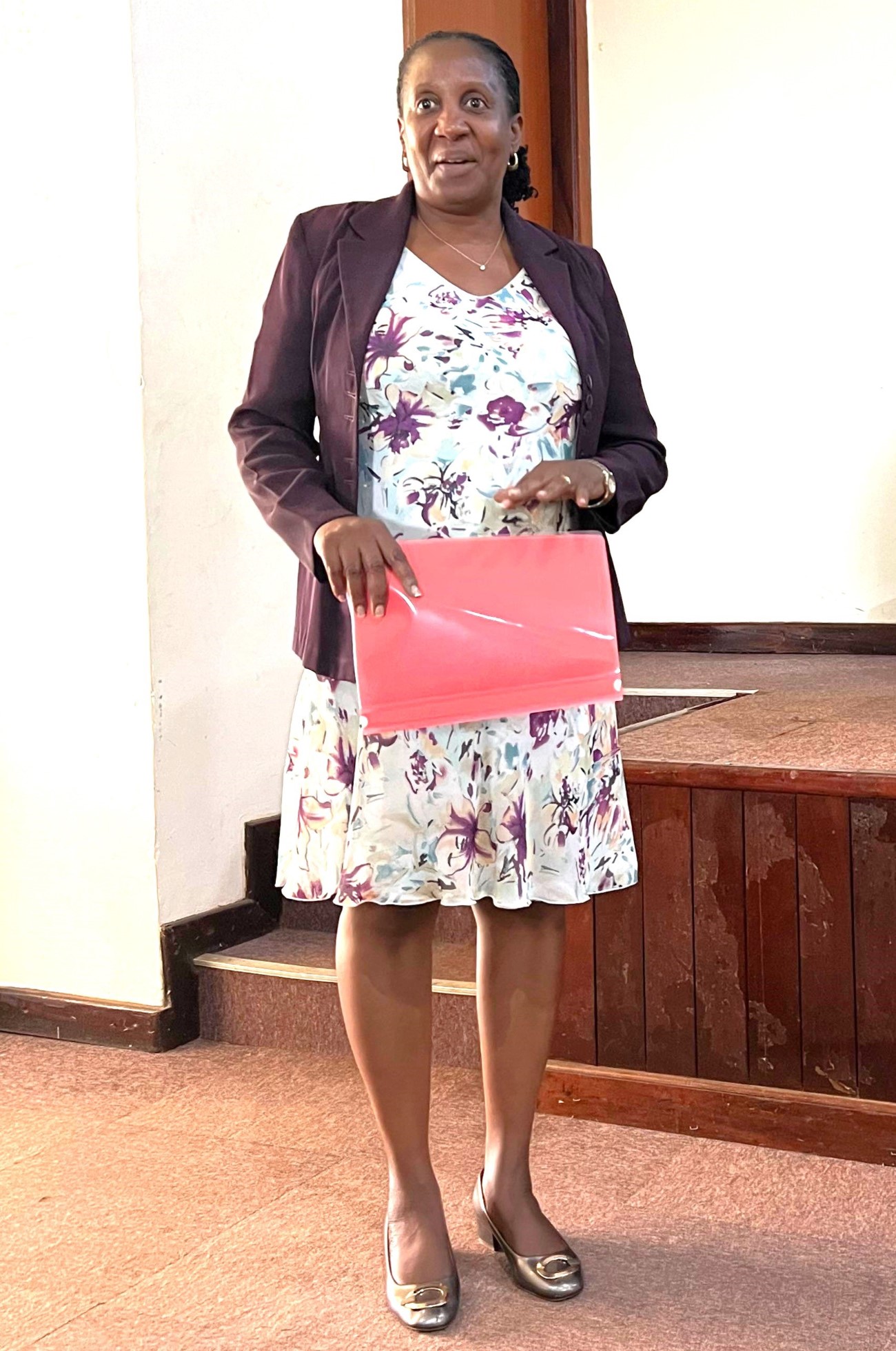
To address the above-mentioned challenges facing the African Continent, Makerere University in partnership with 13 organizations across Europe and Africa developed a project titled, “Sustainable Off-grid solutions for Pharmacies and Hospitals in Africa (SophiA)”. The five-year project that began on 1st October 2021 is funded by the European Union (Project: 101036836 – SophiA – H2020-LC-GD-2-3-2020). At Makerere University, the project is coordinated by Dr. Nicholas Kiggundu, Associate Professor in the Department of Agricultural and Biosystems Engineering, College of Agricultural and Environmental Sciences (CAES).
Piloted in Burkina Faso, Cameroon, Malawi, and Uganda, SophiA aims to provide sustainable off-grid energy solutions to rural and remote health facilities, fostering economic growth and ensuring equitable access to energy and healthcare. Using various technologies, such as photovoltaics, solar thermal, electrical and thermal storage, water treatment and natural refrigerants with low global warming potential, SophiA has developed and manufactured locally innovative, modular, affordable and efficient solar powered systems for providing:
- Safe and clean drinking water, free of bacteria and viruses, and deionised water for medical purposes;
- Hot water and steam production for thermal requirements of the hospitals;
- Cooling of medicines and food at +5°C;
- Low temperature storage of blood plasma and vaccines at -30°C;
- Ultra-low temperature storage of sensitive medication (e.g. some Covid-19 or Ebola vaccines) at -70°C.
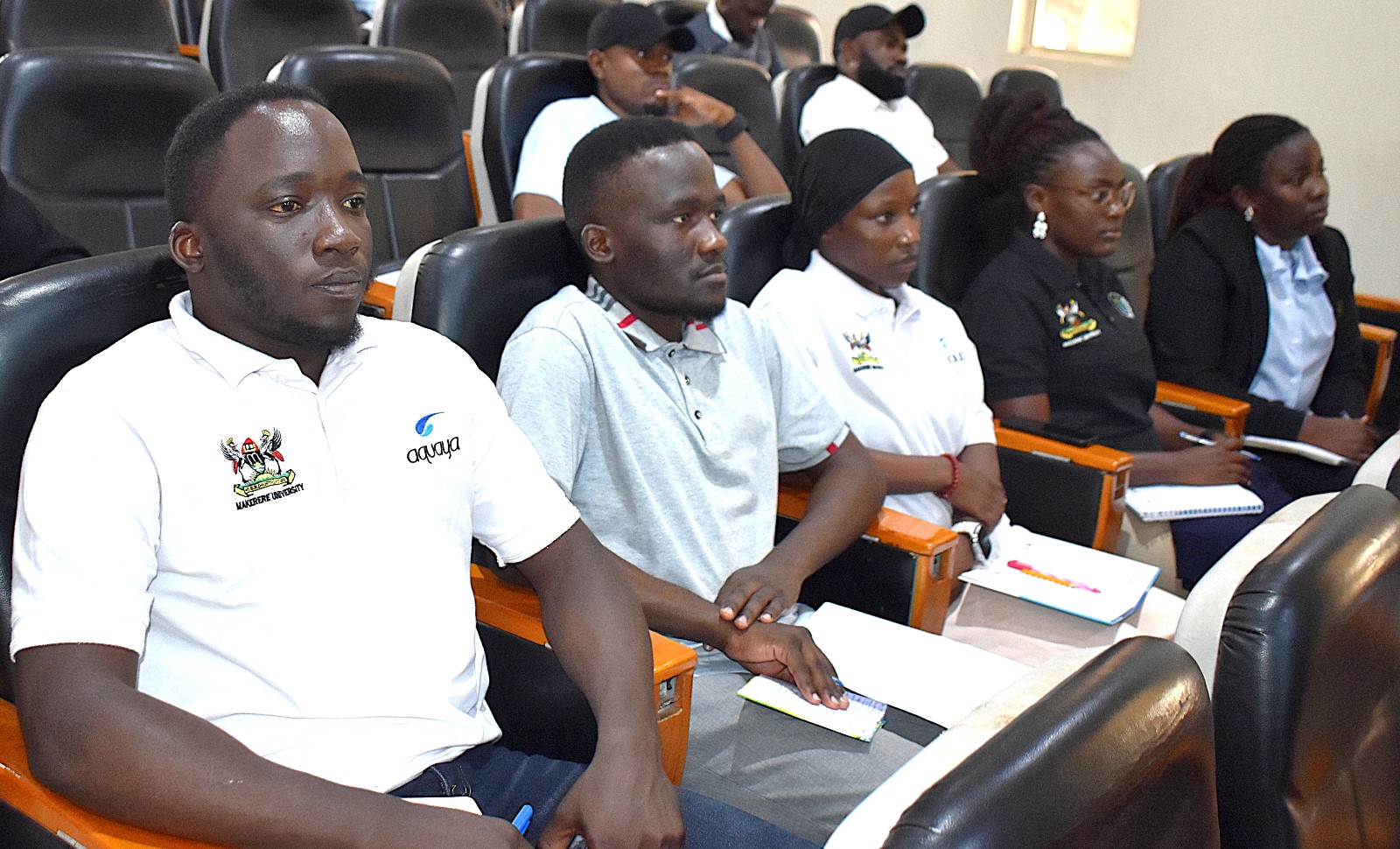
In addition, PV MedPort, a simple and 100% solar-powered solution has been developed and tested as a mobile health care station in small remote areas in 4 different geographical conditions in Africa. The SophiA system has been manufactured in Africa and will provide, for the first-time, innovative solutions based on climate-friendly natural refrigerants to cover cooling demand for three different temperature ranges (-70°C, -30°C and +5°C). The system has been tested and demonstrated at four rural hospitals in remote regions throughout the African continent covering the major geographical regions and different climatic conditions in Burkina Faso, Cameroon, Malawi and Uganda.
SophiA Project initiatives in Uganda
In Uganda, all Health Centre IV hospitals with surgical theatres have been connected to the national grid except Buvuma Health Centre IV, which serves over 120,000 people scattered across 52 islands. Recognizing this gap, the Ministry of Health selected Buvuma Health Centre IV for the SophiA project to demonstrate sustainable off-grid solutions.
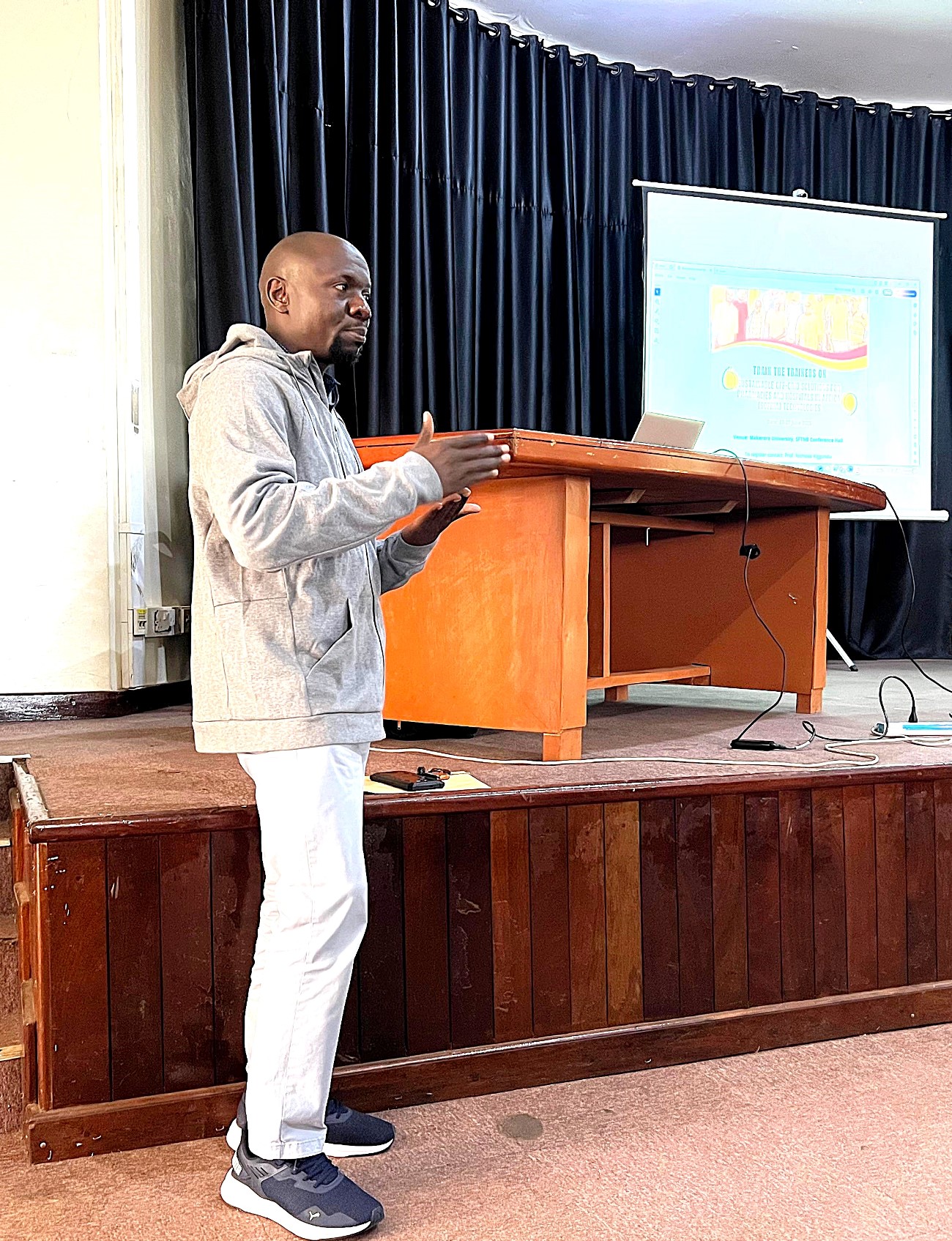
The SophiA System at Buvuma Health Centre IV provides the following services:
- Off-grid electricity supply
- Safe, clean drinking water for patients, staff, and the community
- Hot water and steam systems crucial for maternal care
- Solar-powered cooking and meal preparation
- Cooling systems for surgery and intensive care units
- Refrigeration for medicines at +5°C, blood plasma storage at -30°C, and ultra-low temperature storage (-70°C) for sensitive vaccines such as those for COVID-19 and Ebola
Training of Trainers Workshop
As the SophiA project approaches completion in September 2025, it is vital to establish a skilled pool of technicians capable of handling maintenance and minor repairs of the system components, including solar panels, water treatment units, generators, batteries, and cooking kits.
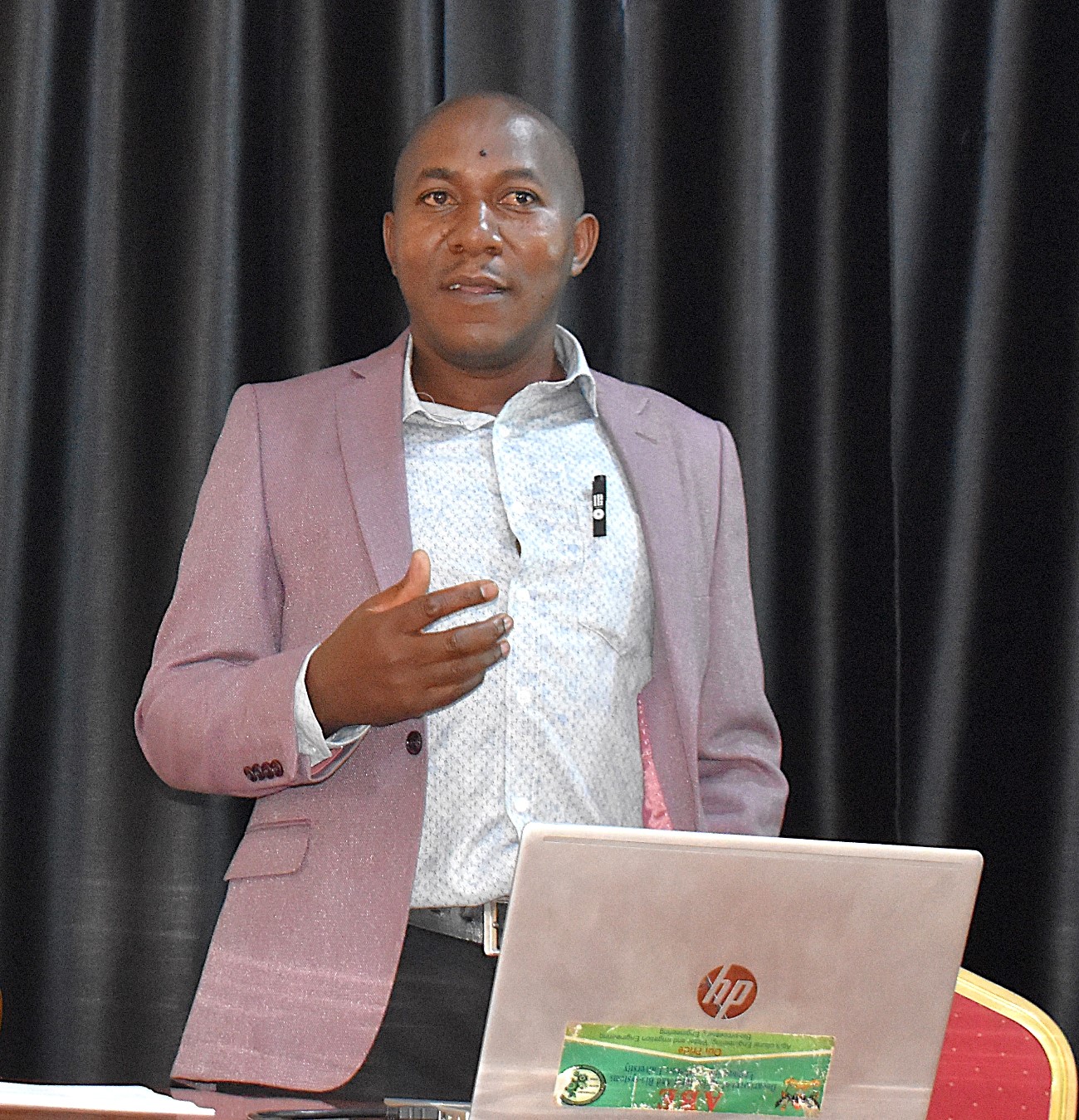
From June 23 to 27, 2025, Makerere University hosted a comprehensive Training of Trainers workshop. The training programme encompassed a diverse range of topics delivered by subject matter experts from institutions, including Makerere University (Department of Agricultural and Biosystems Engineering – CAES, and the College of Engineering, Design, Art and Technology – CEDAT), Hochschule University of Applied Sciences, and Busitema University. Participants were carefully selected from diverse professional backgrounds, including recent engineering graduates from CAES and CEDAT, Makerere University, University technical staff, personnel from Kyambogo University, officials from Buvuma District Works and Health Departments, and electricians from Kampala City. The training sessions were conducted at Makerere University and Buvuma Health Centre IV Hospital.
Training Modules Included:
- Sustainable energy systems and their practical applications
- Energy generation and storage technologies
- Solar water heating: design, operation, maintenance, and performance optimization of solar water heaters, crop dryers, and concentrating solar heaters
- Solar PV technologies in Uganda: cell technology, system design, operations, maintenance, and hands-on practicals for standalone and grid-connected systems
- Public health implications of water quality
- Water treatment and quality management, including protocols, parameters, and case study on the MCDI treatment system
- Water quality testing methodologies
- Introduction to sustainable refrigeration and cooling technologies
- Environmental impact and safety considerations for refrigerants
- Refrigeration cycles and component overview
- Life cycle assessment of SophiA technologies
- Thermal energy storage within the SophiA system
- Steam as a productive energy source
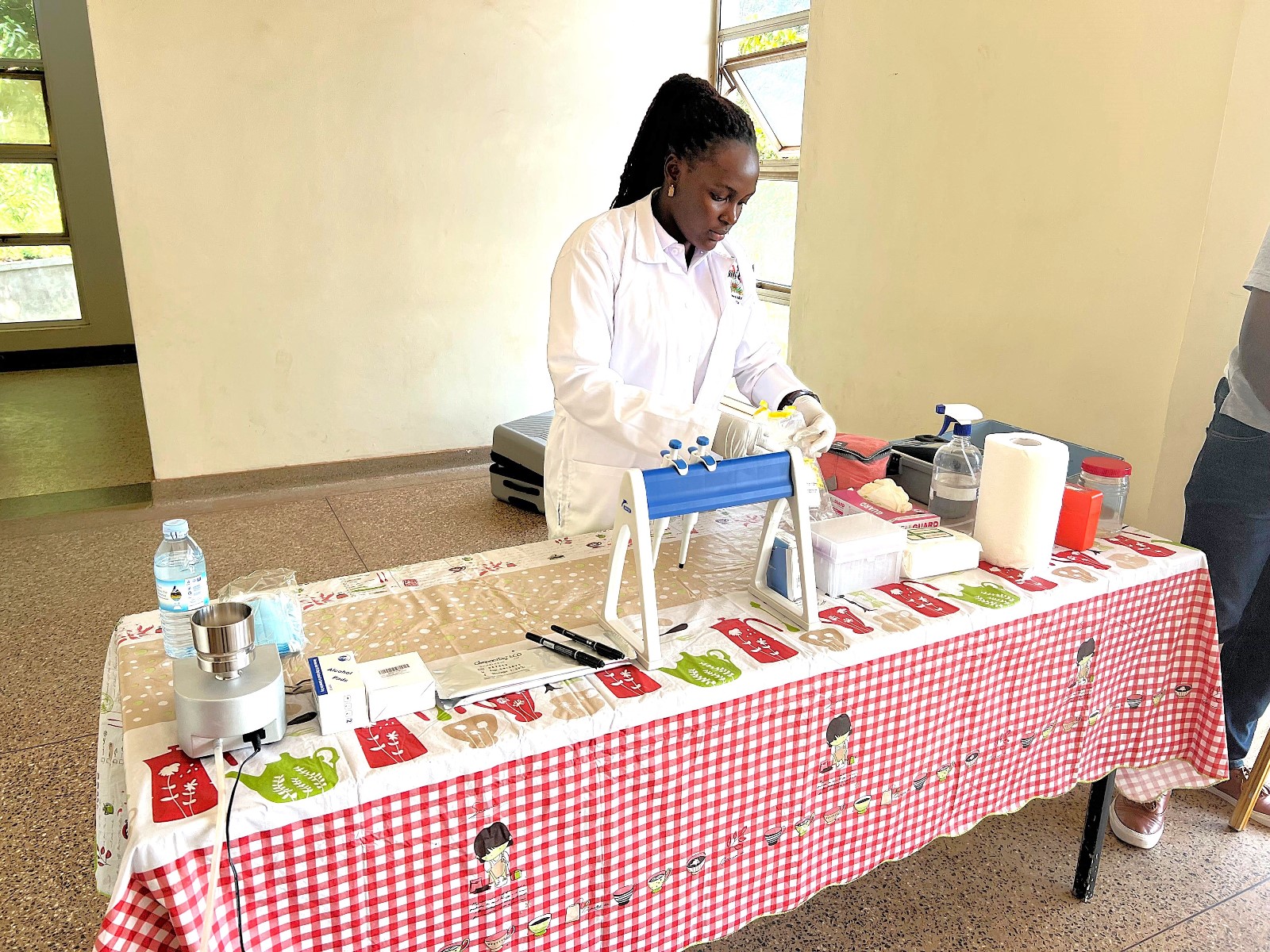
The Training Sessions
Day One: Introduction to foundational concepts in solar energy technologies
The first day of the SophiA Train the Trainers Workshop focused on building foundational knowledge in sustainable and solar energy systems. Led by Dr. Peter Tumutegyereize and Dr. Francis Mujjuni, participants explored a range of technologies and applications critical to clean energy deployment.
Key topics included:
Sustainable Energy Systems: Introduction to renewable energy systems including bioenergy, hydro, wind, geothermal, hydrogen fuel cells, and battery storage.
Solar Radiation & Geometry: Understanding solar constants, irradiance, and the impact of atmospheric conditions on solar performance.
Solar Thermal Technologies: Detailed look at solar water heating systems (FPCs and ETCs), maintenance, sizing, and solar dryers for agricultural and industrial use.
Photovoltaic (PV) Systems: Working principles, types of PV cells, performance factors, and diagnostics. Practical testing techniques and metrics like Voc, Isc, MPP, and PR were discussed.
Simulation & Application: Olivia Nakiwanuka demonstrated a PVsyst-based simulation of a 2.55 kWp standalone system for a conference hall, showing a high solar fraction (97.88%) and low LCOE (USD 0.03/kWh).
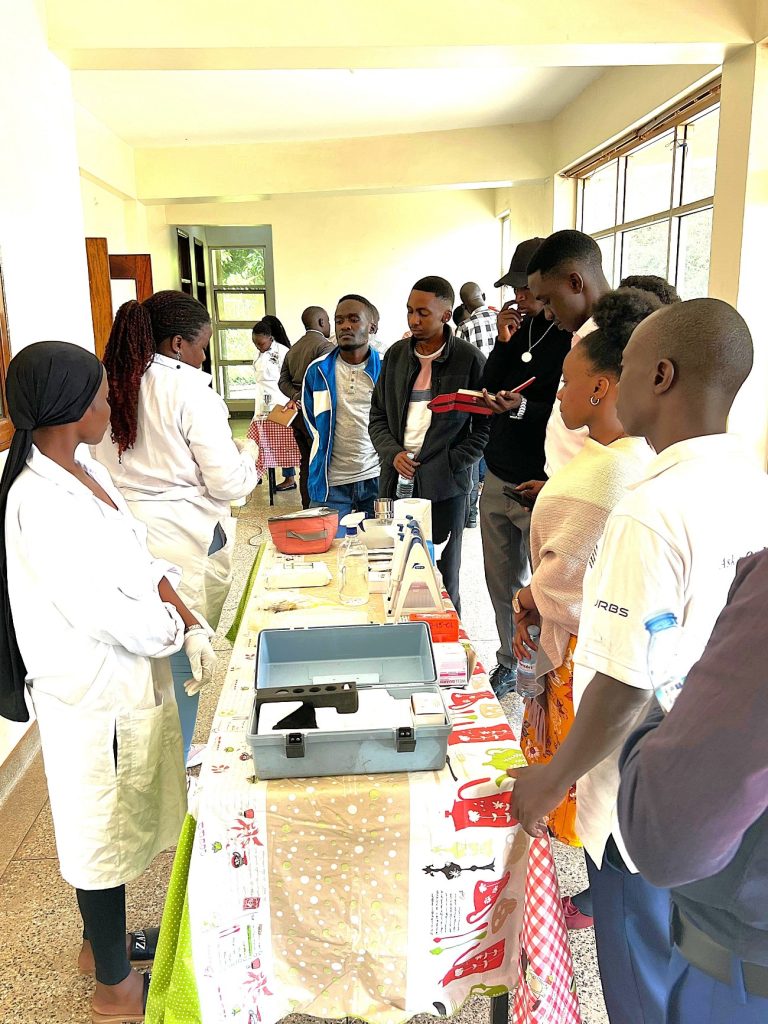
The sessions emphasized practical skills, performance analysis, and real-world application, equipping participants to train others and support solar adoption, especially in rural and off-grid settings.
Day Two: Water Treatment Technologies
The second day focused on water treatment technologies relevant to low-resource healthcare settings. Facilitated by Sneha De and Mr. Duc Dinh Ngoc from Hochschule Karlsruhe University, sessions covered technical, environmental, and operational challenges, with contributions from Dr. Joshua Wanyama on water quality management and Dr. Prossie Nakawuka on practical water testing.
Key challenges addressed included unreliable water supply and contamination in healthcare facilities, emphasizing the need for decentralized water treatment, especially in rural areas.
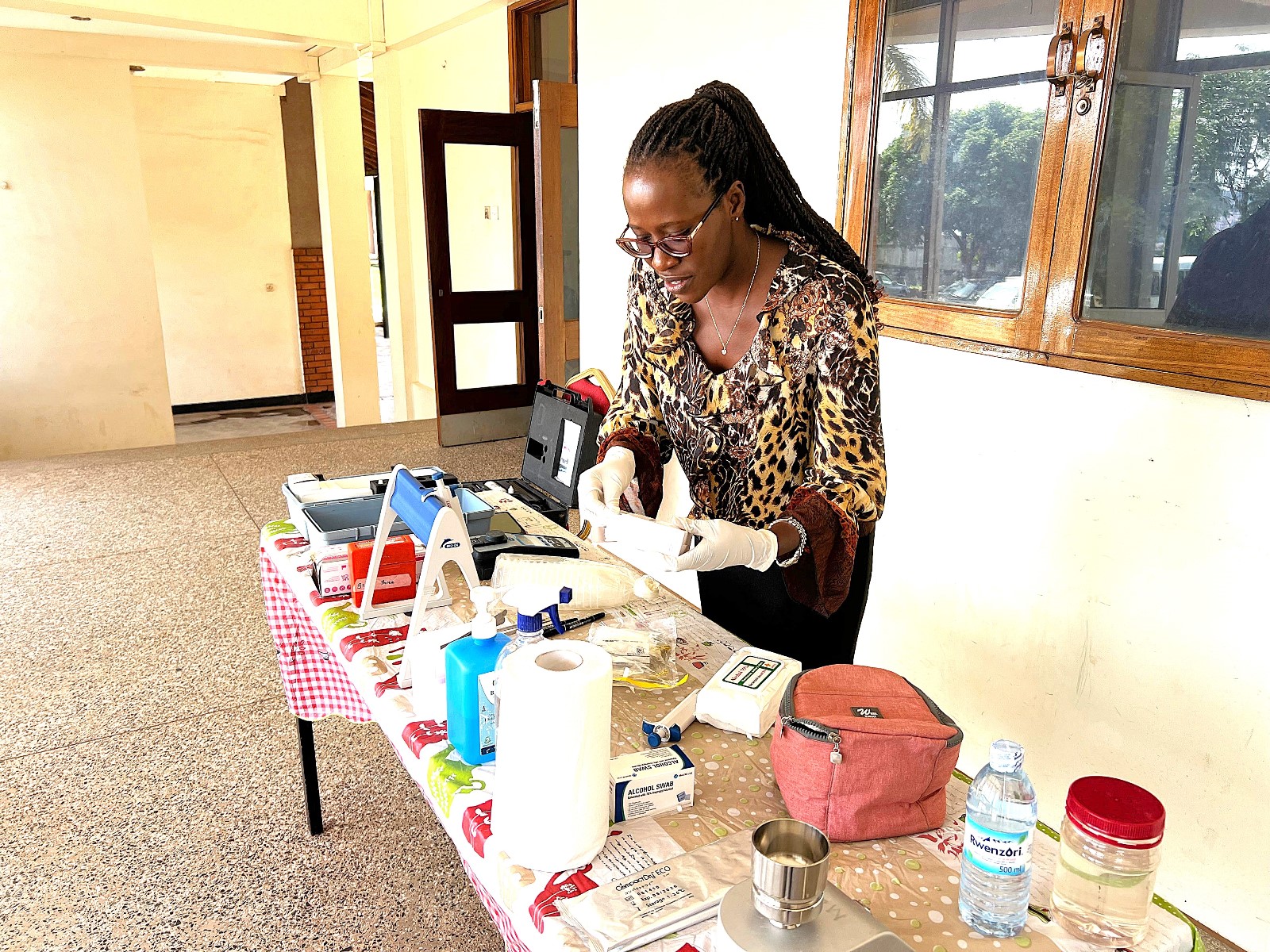
Sneha De reviewed biological and physical/chemical water treatment methods, highlighting technologies such as activated sludge, filtration, membrane bioreactors, and advanced disinfection techniques. The SophiA modular water treatment system, integrating ultrafiltration and membrane capacitive deionisation (MCDI), was introduced as a scalable solution for producing safe drinking and deionised water for medical use.
Mr. Duc Dinh Ngoc trained participants on the MCDI technology, an energy-efficient method for salt and fluoride removal suitable for low-salinity water.
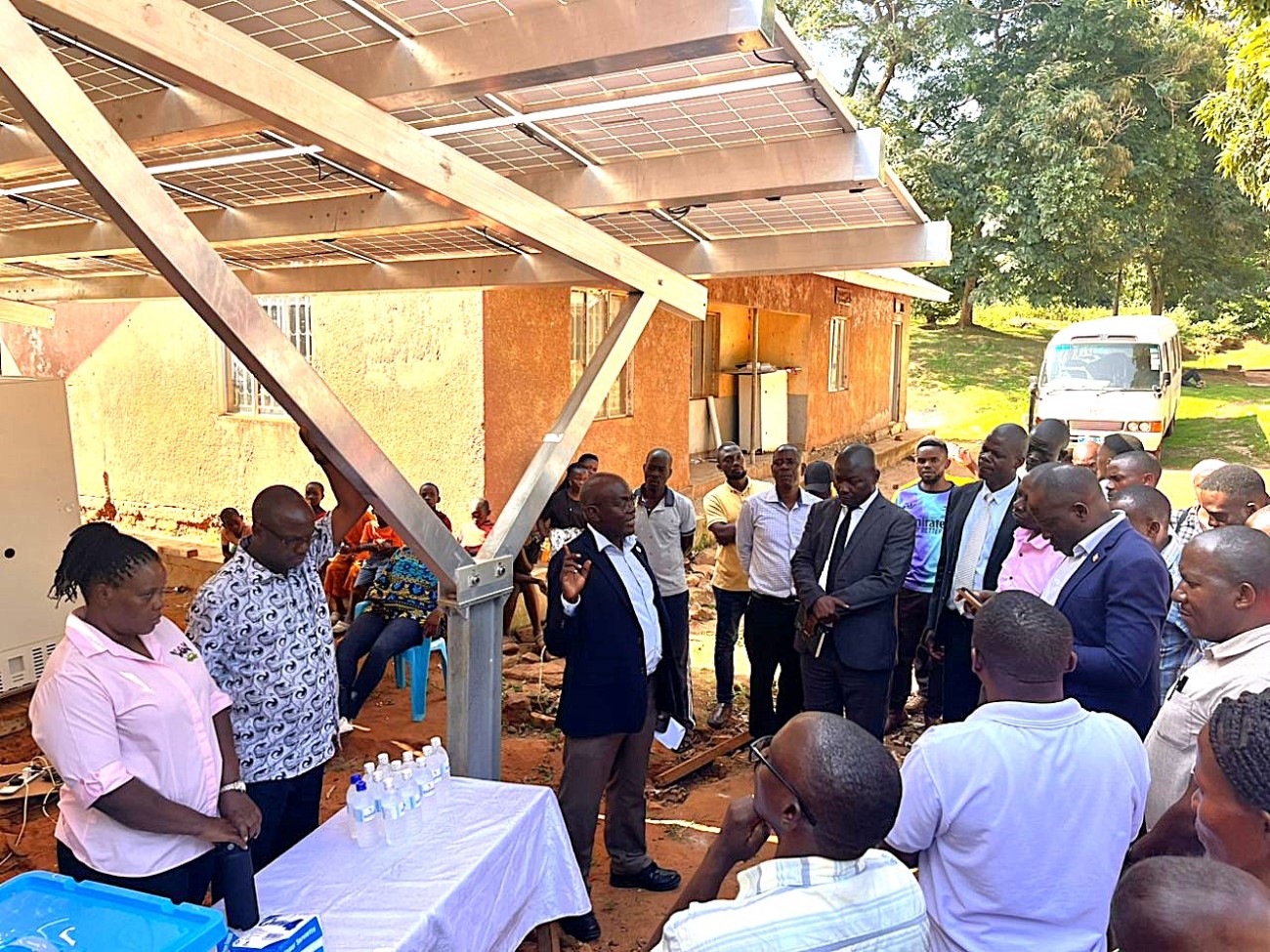
Dr. Joshua Wanyama discussed the water quality management protocols, outlining key physical, chemical, and biological water parameters and monitoring strategies, including modern IoT-based tools, to ensure water safety and public health.
The day concluded with a hands-on lab session by Dr. Prossie Nakawuka, where participants practiced water quality testing using turbidimeters, incubators, and filtration techniques.
Overall, Day Two combined theoretical insights, technology demonstrations, and practical skills, preparing participants to implement sustainable water treatment and quality management systems in healthcare environments.
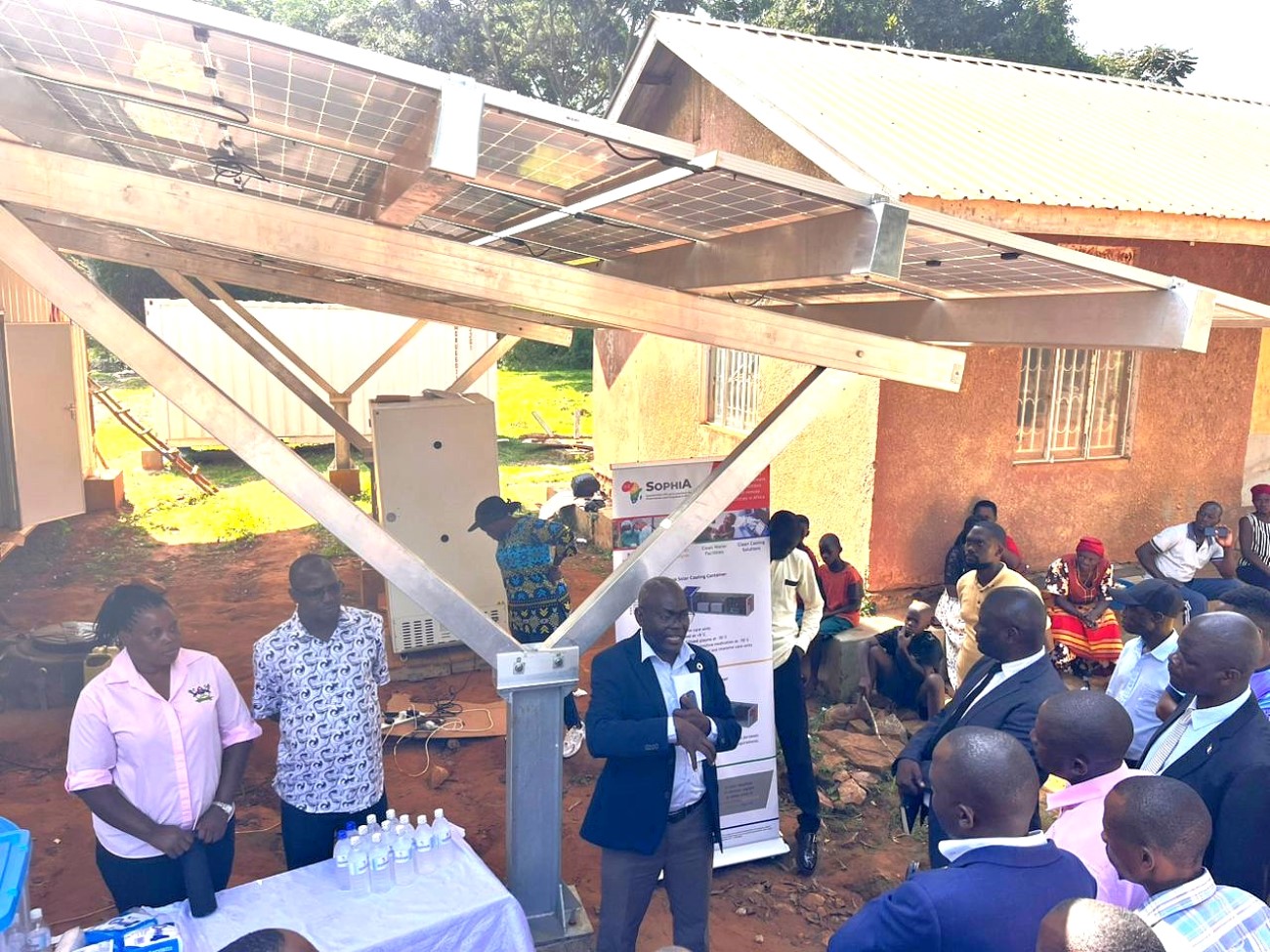
Day Three: Refrigeration and Cold Storage
The third day of the SophiA workshop focused on sustainable refrigeration and cold storage technologies tailored for healthcare in Sub-Saharan Africa. Experts discussed energy-efficient, climate-friendly cooling solutions vital for vaccine storage, medicines, and diagnostics, especially in off-grid and rural settings.
Key highlights included the introduction of solar-powered and biomass-based refrigeration systems, thermal energy storage methods, and the use of natural refrigerants like propane, ammonia, and CO₂ as environmentally safer alternatives. Presentations emphasized the critical role of refrigeration in healthcare and the urgent need to replace harmful chemicals with sustainable technologies.
Sessions covered real-world applications such as the SophiA cooling containers in Burkina Faso, safety protocols for flammable refrigerants, and the environmental and economic benefits of solar refrigeration systems assessed through life cycle analysis.
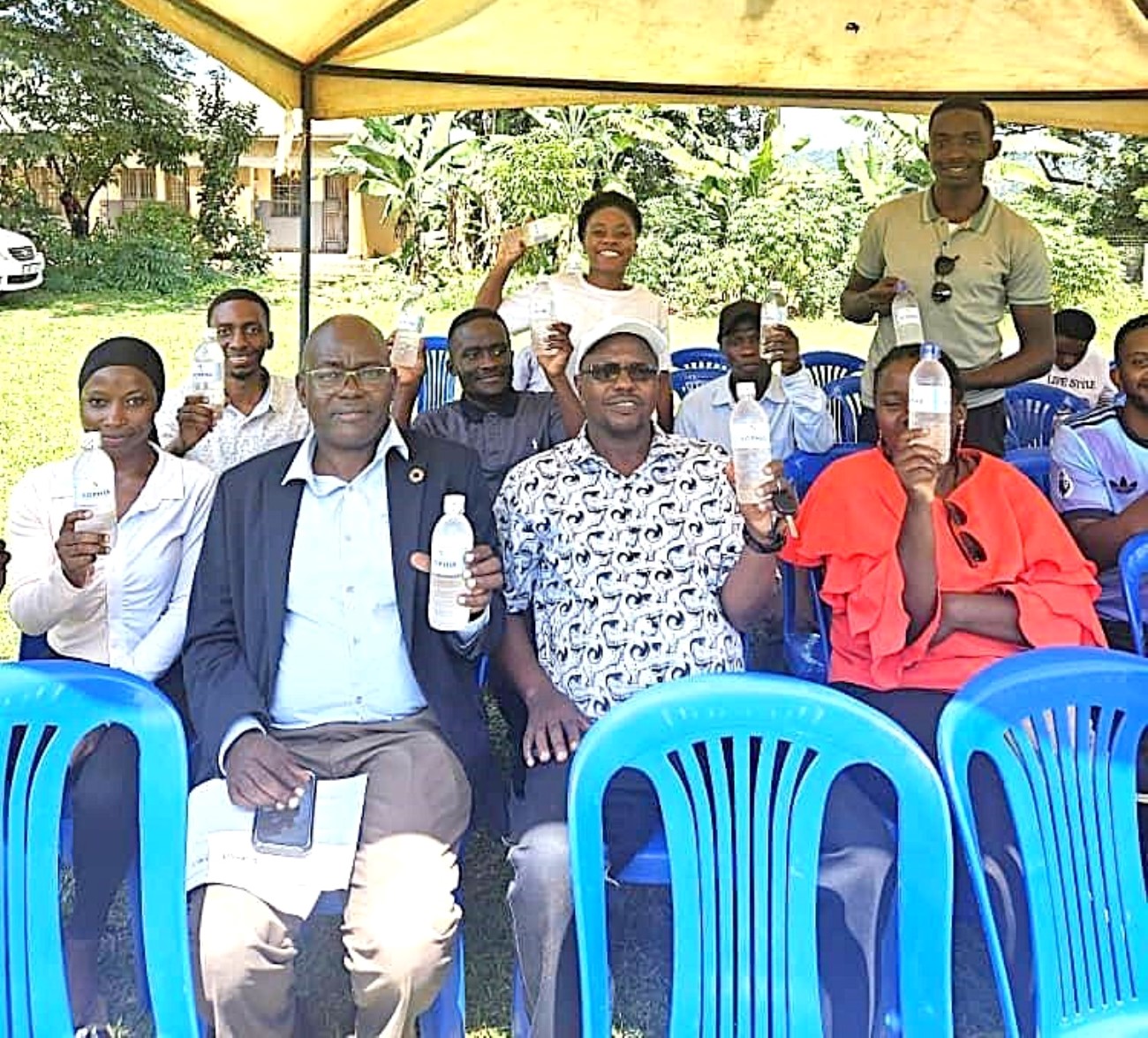
The day ended with an interactive quiz and discussion, reinforcing learning and encouraging participants to apply sustainable cooling practices in their communities.
Day Four: World Refrigeration Day & Field Visit to Buvuma Island
The fourth day of the SophiA Train the Trainers workshop was dedicated to the celebration of the World Refrigeration Day and a field excursion to Buvuma Island, providing participants with a unique opportunity to witness the SophiA system in action. The day was coordinated by Dr. Sarah Bimbona and Dr. Nicholas Kiggundu, who led the delegation to Buvuma Health Centre IV, the pilot site for the SophiA installation in Uganda.
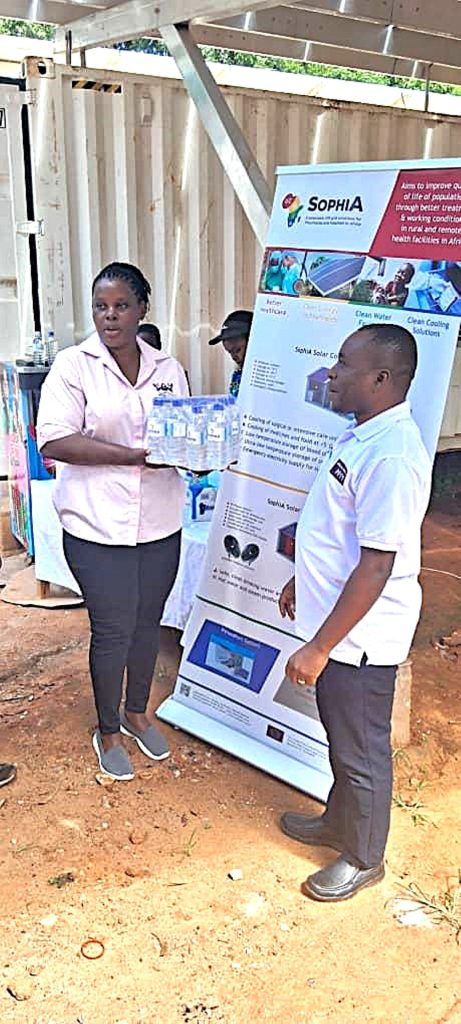
The visit served as both a practical extension of the previous day’s technical sessions and a community engagement event. Participants were able to observe the installed SophiA system, which integrates solar-powered refrigeration, water treatment and steam generation technologies designed for off-grid healthcare settings. During the visit, Dr. Kiggundu provided a detailed briefing to local stakeholders, including representatives from the Buvuma District Local Government, delegates from the Buganda Kingdom, and members of the local community. He explained how the SophiA system will enhance healthcare delivery on the island through reliable cold storage for vaccines and medicines, access to clean drinking water, and steam generated for cooking and use in the maternity wards.
As part of the long-term sustainability plan for the SophiA system, the launch of SophiA Water was announced, an entrepreneurial initiative designed to generate revenue locally for the operation and maintenance of the system.
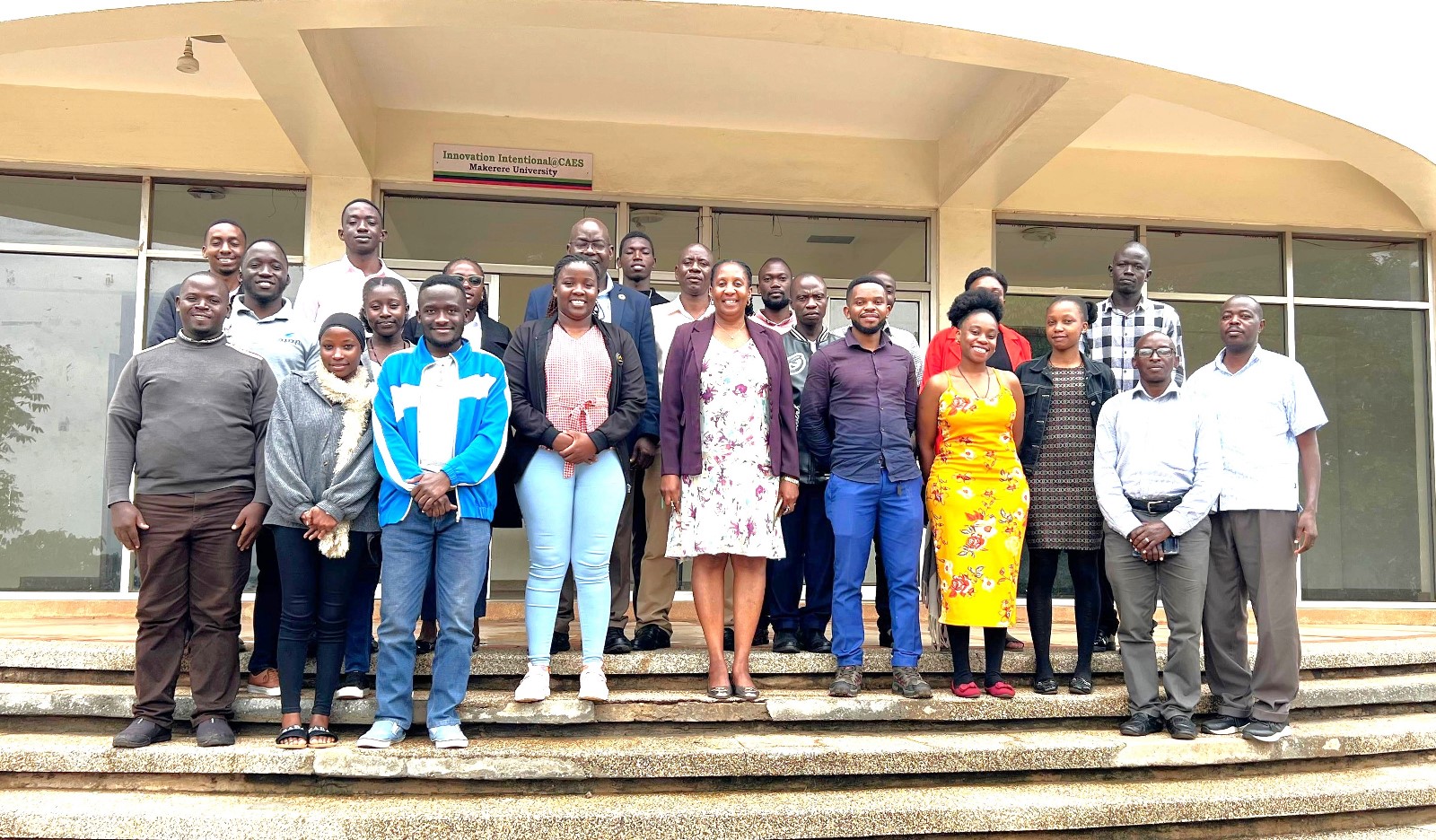
The field trip ended with a certificate awarding ceremony in appreciation of the participants’ dedication and active engagement throughout the training programme.
Agriculture & Environment
APRC Trains Graduate Students & Stakeholders in the Use of the African Agriculture Adaptation Atlas
Published
2 weeks agoon
July 3, 2025
The Agricultural Policy Research Centre (APRC), housed within the College of Agricultural and Environmental Sciences (CAES) at Makerere University, continues to play a pivotal role in shaping Uganda’s agricultural future through evidence-based policymaking. With a mission to ensure that agricultural policies are grounded in empirical research and data, APRC is actively investing in capacity-building initiatives that empower researchers, policymakers, and development actors.
In a significant stride toward building climate resilience in African agriculture, APRC recently organized a two-day intensive training workshop focused on the African Agriculture Adaptation Atlas (AAAA) – a state-of-the-art, web-based decision-support platform that facilitates the integration of climate data into agricultural planning and policy.

The workshop, held on Wednesday 25th and Thursday 26th June 2025 at the School of Agricultural Sciences, Makerere University, targeted two key groups: graduate students on the first day, and university faculty, government officials, and development practitioners on the second. This structure ensured tailored learning experiences for both emerging and seasoned professionals, helping to bridge the gap between academic research and real-world policy implementation.
The African Agriculture Adaptation Atlas (AAAA) is designed to provide dynamic, data-rich visualizations that support informed decision-making in agriculture and food systems across the continent. Through interactive maps and analytical tools, users can explore projected climate impacts, evaluate risks, and identify localized, climate-smart adaptation strategies.

Throughout the sessions, participants received hands-on training in a broad range of AAAA functionalities, including:
- Leveraging the Atlas for research and policy communication: Enhancing the ability of scientists and policy actors to translate complex climate data into actionable insights;
- Assessing projected climate impacts and associated agricultural risks: Essential for forward-looking planning and risk mitigation;
- Identifying climate-smart investment options, with a particular focus on the livestock sector, which is especially vulnerable to climate shocks;
- Analysing gendered vulnerabilities: Examining how climate change disproportionately affects women in agricultural communities;
- Understanding the implications of heat stress on agricultural productivity: Supporting targeted interventions to protect producers and their livelihoods;
- Estimating the economic returns of adaptation strategies: Aiding in prioritizing investments and allocating limited resources effectively.

Prof. Bernard Bashaasha, the APRC Coordinator, emphasized the importance of the training in advancing Africa’s adaptation agenda. “As climate change continues to threaten food security and disrupt livelihoods across the continent, tools like the AAAA, and the skills to use them effectively are essential. They empower decision-makers to craft policies that are adaptive, inclusive, and rooted in science,” he noted.
The workshop was coordinated by Dr. Florence Rwiza, Lecturer in the Department of Agribusiness and Natural Resource Economics at CAES.
More photos from the Training






Trending
-

 General2 weeks ago
General2 weeks agoRe-advert: Admission to Undergraduate Programmes 2025/2026
-

 General1 week ago
General1 week agoRe-Advert for Applications for Diploma and Certificate Training
-

 General5 days ago
General5 days agoMakerere University Fees Waiver for 40 First Year Female Students 2025/2026
-

 General2 weeks ago
General2 weeks agoPress Statement on Ranking
-

 Health1 week ago
Health1 week agoCall for Applications: Responsible Conduct of Research (RCR) Training Course
